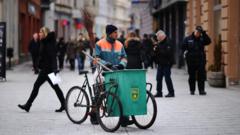In July 1995, the Srebrenica massacre, marked by the tragic loss of over 8,000 Bosnian men and boys, stands as a stark testament to one of the most horrific chapters in European history since World War II. Nearly three decades later, the shadows of this atrocity continue to loom large, underscoring divisions within contemporary Bosnia and Herzegovina, a nation caught between its traumatic past and an uncertain future.
The recent premiere of the play "Flowers of Srebrenica" at Sarajevo's War Theatre powerfully encapsulates the ongoing struggle with grief, trauma, and identity. The production depicts the harrowing experiences of those affected by the massacre, where souls are still searching for closure amidst the haunting memories of exhumed mass graves and the scars left behind. Despite the audience's warm applause, the echoes of Srebrenica are met with stark contrasts just a short distance away in Republika Srpska—where many Serb leaders continue to deny the genocide's occurrence.
As artistic expressions serve to cope with the sorrow, political entities exacerbate the existing wounds. The Dayton Peace Agreement, while crucial in ceasing hostilities, further entrenched ethnic divides. Presently, United Nations-expert Christian Schmidt faces significant challenges as the political climate grows increasingly volatile, particularly under the leadership of Milorad Dodik, who has openly expressed intentions to withdraw from national institutions, igniting fears reminiscent of the conflict-worn 1990s.
In Sarajevo, the memory of July 11 resonates deeply. Hundreds braved the rain to honor victims at Potočari Cemetery, contrasting sharply with the absence of commemorations in the majority-Serb region. Saša Košarac from the Republika Srpska government has suggested that focusing on Srebrenica merely exacerbates national tensions, while countless others rally in solidarity, advocating for recognition and remembrance of those lost.
Yet, for many, the delicate memories tied to Srebrenica exist uneasily alongside rising ethnic tensions and a fear of displacement, as sentiments among the Bosniak community reflect a crisis of confidence in their safety. Mirela Osmanović, who works at the Srebrenica Memorial Center, highlights this reignited vulnerability, emphasizing a sentiment echoed by many who feel the weight of historical injustices compounded by present-day narratives.
As Bosnia grapples with its past, the haunting legacy of Srebrenica serves not only as a reminder of a tragedy but as a call to action—confronting the truths that linger in political rhetoric, engaging with the memories of victims, and fostering a narrative of reconciliation rather than division.
The recent premiere of the play "Flowers of Srebrenica" at Sarajevo's War Theatre powerfully encapsulates the ongoing struggle with grief, trauma, and identity. The production depicts the harrowing experiences of those affected by the massacre, where souls are still searching for closure amidst the haunting memories of exhumed mass graves and the scars left behind. Despite the audience's warm applause, the echoes of Srebrenica are met with stark contrasts just a short distance away in Republika Srpska—where many Serb leaders continue to deny the genocide's occurrence.
As artistic expressions serve to cope with the sorrow, political entities exacerbate the existing wounds. The Dayton Peace Agreement, while crucial in ceasing hostilities, further entrenched ethnic divides. Presently, United Nations-expert Christian Schmidt faces significant challenges as the political climate grows increasingly volatile, particularly under the leadership of Milorad Dodik, who has openly expressed intentions to withdraw from national institutions, igniting fears reminiscent of the conflict-worn 1990s.
In Sarajevo, the memory of July 11 resonates deeply. Hundreds braved the rain to honor victims at Potočari Cemetery, contrasting sharply with the absence of commemorations in the majority-Serb region. Saša Košarac from the Republika Srpska government has suggested that focusing on Srebrenica merely exacerbates national tensions, while countless others rally in solidarity, advocating for recognition and remembrance of those lost.
Yet, for many, the delicate memories tied to Srebrenica exist uneasily alongside rising ethnic tensions and a fear of displacement, as sentiments among the Bosniak community reflect a crisis of confidence in their safety. Mirela Osmanović, who works at the Srebrenica Memorial Center, highlights this reignited vulnerability, emphasizing a sentiment echoed by many who feel the weight of historical injustices compounded by present-day narratives.
As Bosnia grapples with its past, the haunting legacy of Srebrenica serves not only as a reminder of a tragedy but as a call to action—confronting the truths that linger in political rhetoric, engaging with the memories of victims, and fostering a narrative of reconciliation rather than division.
















